Bespoke Data Analysis Software
What is Data analysis software?
Data analysis software is a customized software solution that is designed to help businesses analyze vast amounts of data to extract valuable insights. This type of software offers an array of tools and techniques that facilitate data cleaning, data transformation, and data visualization to help businesses make informed decisions.Contact us if you are wanting to have a bespoke Data Analysis application developed?
The uses of data analysis software are wide-ranging and diverse, with applications in nearly all industries. For example, businesses in retail, e-commerce, and healthcare can use this software to analyze customer data, identify patterns, and predict future customer behavior. Financial institutions can use it to analyze market trends, manage risks, and detect fraudulent activities. Manufacturing companies can use it to optimize production processes, streamline supply chain management, and reduce production costs.
Moreover, data analysis software can be used for social media analysis, sentiment analysis, customer segmentation, anomaly detection, and predictive maintenance, among other use cases. The software allows businesses to access critical insights that help them gain a competitive edge in their respective industries.
In conclusion, data analysis software is a powerful tool that can help businesses extract valuable insights from their data. Its wide range of applications makes it an indispensable asset for businesses seeking to stay ahead of the competition. Whether it's customer analysis, financial analysis, or manufacturing optimization, data analysis software is a must-have in today's data-driven world.

What are the main functions of Data analysis software?
Data analysis software comprises several modules with connected functionality that work together to provide comprehensive data analysis. These modules include data processing, data visualization, statistical analysis, machine learning, and reporting.Data Processing Module: This module has functionality for data cleaning, data transformation and data integration. It prepares the data for analysis by removing duplicates, handling missing values, and standardizing data.
Data Visualization Module: This module provides the ability to display data visually in different forms- pie charts, scatter plots, bar graphs or heat maps. It allows users to gain insight into data patterns and trends visually.
Statistical Analysis Module: This module performs statistical analysis on the data to identify patterns or relationships. It includes techniques such as regression analysis, correlation, and hypothesis testing.
Machine Learning Module: This module provides the ability to apply machine learning algorithms on the data to create predictive models. It uses algorithms such as decision trees, neural networks, and random forests.
Reporting Module: This module provides customized reporting functionality to present data analysis results to stakeholders. This includes the ability to create dashboards, slide presentations, and summary reports.
The combination of these modules provides powerful data analysis capabilities that can be customized to meet the specific needs of business owners. Data analysis software can help business owners gain essential insights into data and make informed decisions.
Data / systems integration
Data analysis software is often integrated with a variety of systems, including database management systems, customer relationship management (CRM) platforms, enterprise resource planning (ERP) software, and business intelligence (BI) tools. APIs, or application programming interfaces, are commonly used to facilitate this integration by allowing different software systems to communicate with one another and share data.When integrating data analysis software with other systems, there are several considerations to keep in mind. First and foremost, it's important to ensure that the data being shared between systems is accurate, complete, and up-to-date. This requires careful planning and coordination between the teams responsible for each system, and may involve defining data standards, establishing data governance policies, and implementing data quality management tools.
Another important consideration when integrating data analysis software with other systems is security. Any time data is shared between systems, there is the risk of unauthorized access, data breaches, and other security threats. To mitigate these risks, it's important to implement robust security measures such as encryption, access controls, and monitoring tools.
Finally, when integrating data analysis software with other systems, it's important to consider the scalability and performance of each system. Depending on the volume of data being processed and analyzed, it may be necessary to optimize the systems to ensure fast and efficient processing. This may involve upgrading hardware, optimizing software configurations, or implementing caching mechanisms to improve performance.
Who uses Data analysis software?
Organizations from various industries such as finance, healthcare, education, retail, manufacturing, and more utilize data analysis software for their data-related needs. The size of the organization does not matter as both small and large companies require this software to sift through data and extract insights that will guide and support their decision-making processes. Additionally, data analysis software can benefit vertical markets such as government, non-profit, and private organizations regardless of the scale of their operations. With the increasing demand for big data analysis and artificial intelligence, more organizations are embracing data analysis software and incorporating it into their daily operations.
Benefits of Data analysis software
Organisations use data analysis software to gather, analyze, and interpret large amounts of data efficiently and accurately. The key benefits of implementing custom data analysis software include the ability to uncover insights and trends that would be difficult to identify manually, enabling data-driven decision-making. Custom software also allows organisations to tailor data analysis to their specific needs and integrate data from multiple sources, providing a more comprehensive view of their business. Additionally, data analysis software can help organisations identify potential areas of improvement, detect anomalies and prevent fraud, and ultimately drive revenue growth and profitability. Overall, the utilisation of custom data analysis software is a crucial advantage for businesses in today's data-driven landscape.Some of the players in the Data analysis software market
Some of the main brands of data analysis software include Microsoft Power BI, Tableau, QlikView, and SAP BusinessObjects.Microsoft Power BI is a user-friendly data visualization tool that integrates well with other Microsoft applications. It has a large user community and offers a free version for small-scale use. However, some users have reported issues with data modeling and cleanup functionalities.
Tableau has a strong reputation for its ease of use and comprehensive data visualization capabilities. It can handle large amounts of data and provide insights quickly. However, it can be expensive for smaller businesses and some users have reported difficulties with integrating data from multiple sources.
QlikView is known for its fast and intuitive data discovery capabilities, allowing users to explore data in real-time. It also includes a variety of data integration options. However, it can be difficult to learn for those without a technical background and has limited support for mobile devices.
SAP BusinessObjects is an enterprise-level data analysis software with a wide range of features and integrations with other SAP products. It has a robust security system and can handle large volumes of data. However, it can be expensive and difficult to implement for smaller businesses.
Overall, it is important for business owners to carefully evaluate their specific needs and budget before selecting a data analysis software. It is also important to consider factors such as ease of use, available support, and integration capabilities.
Benefits of off-the-shelf Data analysis software
Off-the-shelf data analysis software offers a number of benefits for businesses looking to analyze their data. Firstly, it is often readily available and can be purchased and installed quickly, allowing businesses to start analyzing their data and making informed decisions without delay. Additionally, it may be more affordable than custom data analysis software, particularly for smaller businesses where budgets are more limited.Off-the-shelf software solutions also typically offer a range of features and functionality, making it possible for businesses to find a product that meets their specific needs without requiring customization. These features may include data visualization tools, predictive analytics, and reporting capabilities, among others.
Another key benefit of off-the-shelf data analysis software is that it is often more widely adopted and tested than custom solutions, which means that it is likely to be more stable and reliable. This can be particularly important for businesses that rely heavily on their data analysis software and need to ensure that it is always available.
Finally, off-the-shelf software solutions may also offer access to support and training resources, which can help businesses get the most out of their investment and ensure that the software is being used effectively. This can be particularly valuable for businesses that are new to data analysis or that need to quickly get up to speed on new tools and techniques.
Limitations of off-the-shelf Data analysis software
Off-the-shelf data analysis software may seem like an easy and cost-effective solution for businesses looking to analyze their data, but it comes with its own set of limitations.First and foremost, these software solutions are built with a one-size-fits-all approach. That means they are designed to cater to a broad audience, and may not fully align with the specific needs of a particular business. For example, if a business deals with complex and unique data sets, an off-the-shelf solution may not be able to handle the intricacies of that data.
Secondly, off-the-shelf solutions may also lack the flexibility required to adapt to a growing business. As a business expands, their data analysis needs may evolve as well, requiring more nuanced and advanced analytical capabilities. An off-the-shelf software may struggle to keep up with such evolving requirements.
Another limitation of off-the-shelf software is the lack of customization options. Businesses may want to personalize their analytics software to be in line with their branding and style. With a fixed software solution, customization options can be very limited.
Lastly, off-the-shelf data analysis software may not provide a high level of security. In an age where data privacy is becoming increasingly important, businesses may be at risk of data breaches or leaks by relying on generic software solutions that may not prioritize the safety of their data.
In summary, while off-the-shelf data analysis software may seem like a convenient option, businesses must assess their specific needs and weigh the limitations of generic solutions. A bespoke data analysis software tailored to a businesses' unique needs can provide greater flexibility, customizability, and security that an off-the-shelf option may not be able to offer.
Is bespoke Data analysis software a viable option?
Bespoke or partially bespoke data analysis software provides businesses with greater customization and flexibility when dealing with their data. This type of software can be tailored specifically to the business's unique needs and requirements, allowing them to analyze their data in a way that is most meaningful to their operations.Some successful use cases of bespoke data analysis software include:
1. E-commerce companies: Bespoke software can help e-commerce businesses optimize their pricing and inventory management strategies. By analyzing transaction data, the software can provide insights into which products are selling well and at what price points, allowing companies to adjust their pricing and inventory accordingly.
2. Healthcare providers: Bespoke software can be used to analyze patient data and identify trends and patterns that can lead to better patient outcomes. For example, analyzing patient data can help healthcare providers identify patients who are at a higher risk for certain diseases or conditions, allowing for early intervention and treatment.
3. Financial institutions: Bespoke software can be used to analyze financial data and identify trends and patterns that can inform investment decisions. By analyzing market data, the software can provide insights into which investments are likely to perform well, allowing financial institutions to make more informed investment decisions.
The benefits of bespoke or partially bespoke data analysis software include:
1. Customization: Bespoke software is tailored specifically to the needs and requirements of the business, allowing for greater customization and flexibility.
2. Scalability: Bespoke software can be scaled up or down as needed, allowing businesses to adapt to changing data volumes and analytical needs.
3. Improved insights: By analyzing data in a way that is most meaningful to the business, bespoke software can provide insights that are not available with off-the-shelf solutions.
4. Competitive advantage: By using bespoke software, businesses can gain a competitive advantage by leveraging their data in a way that is unique to their operations.
Overall, bespoke or partially bespoke data analysis software can provide businesses with a powerful tool for analyzing their data in a way that is most meaningful to their operations. By providing greater customization and flexibility, bespoke software can help businesses gain a competitive advantage and make more informed decisions based on their data.

Fun facts about Data analysis software
Data analysis software has become increasingly popular among businesses, with the global market for analytics software expected to reach $132.9 billion by 2022.One of the key benefits of custom data analysis software is that it can be tailored to the specific needs of a business, allowing for more accurate and efficient analysis of data.
Data analysis software can be used across a wide range of industries, from healthcare to finance to retail. It can also be used for a variety of purposes, such as predicting consumer behavior, optimizing supply chain management, and identifying trends and patterns in data.
In addition to traditional data analysis methods, such as statistical analysis and machine learning, newer technologies such as natural language processing and computer vision are also being incorporated into data analysis software.
There is a growing demand for real-time data analysis, as businesses seek to make faster and more informed decisions based on up-to-the-minute information.
Data analysis software can help businesses to identify and address potential issues before they become major problems, as well as to uncover opportunities for growth and improvement.
Finally, it is important to note that while data analysis software can offer many benefits, it is not a one-size-fits-all solution. It is essential for businesses to work with experienced software developers who can create a custom solution that meets their specific needs and goals.
Data analysis software FAQ
1. What are the benefits of having a custom data analysis software developed for my business?Having a custom data analysis software developed specifically for your business can provide numerous benefits. It can allow for faster and more accurate data processing and analysis, customized reporting tailored to your business needs, and automated data visualization. It can also provide insights into your business operations and customer behavior that can help inform decision-making and drive growth.
2. How do I know if my business needs a custom data analysis software?
If your business has large amounts of data that requires analysis or you need more customized reporting than off-the-shelf software can provide, then a custom data analysis software might be the solution for you. Additionally, if you need to automate repetitive data processing and analysis tasks, a custom software solution can save time and improve accuracy.
3. What are the steps involved in developing a custom data analysis software?
The development process can vary depending on the specific needs of your business, but generally involves defining requirements, designing the software architecture, coding and testing, and deployment. Throughout the process, there will be continual communication and collaboration between the development team and your business to ensure the software meets all requirements.
4. How long does it take to develop a custom data analysis software?
The development time for a custom software solution can vary depending on the complexity of the project and the specific requirements of your business. A simpler project may take a few months to complete, while a more complex project may take a year or longer.
5. How much does it cost to develop a custom data analysis software?
The cost of developing a custom software solution can vary depending on the scope of the project, the complexity of the software, and the number of developers needed to complete the project. However, as a bespoke software development company, we work with clients to develop customized solutions within their budget constraints.
6. How do you ensure the security and privacy of my business data while developing custom software?
We take data security and privacy very seriously. Our team follows industry-standard security protocols and we employ encryption and other security measures to protect your business data. We also sign non-disclosure agreements with clients to ensure their information is kept confidential.
7. What kind of ongoing support is provided after the custom data analysis software is developed?
We provide ongoing support and maintenance to ensure the software is running smoothly and any issues are addressed promptly. We also offer training and consultation services to ensure your team is proficient in using the software and achieving optimal results.
Next Steps?
If you're looking for a competitive edge in today's market, bespoke data analysis software may be the solution you need. With the right tools in place, you can unlock valuable insights, streamline operations, and make data-driven decisions with confidence. At our software development company, we specialize in building custom solutions that meet the unique needs of businesses like yours.Whether you're dealing with massive amounts of data or need to integrate existing systems, we have the expertise to deliver a solution that works for you. Our team of experts has deep knowledge in data analysis software, data analytics software, and analytics software. We can work with you to create a seamless user experience that empowers your team to access and analyze data from anywhere, at any time.
Don't settle for off-the-shelf solutions that don't meet your needs. We believe that bespoke data analysis software is the key to unlocking your business's full potential. Contact us today to learn more about how we can help you build a custom solution that delivers real results. We're ready to partner with you to achieve success!
Read more about the main software category Collaboration Applications.
Other services in Collaboration Applications category:
Want a quick quote for the development of custom Data Analysis Application?
Contact us to discuss your questions about bespoke Data Analysis Applications.
